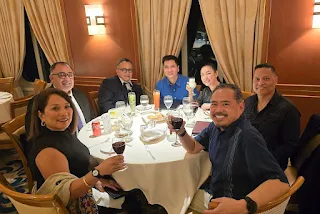The photo attached to this post — my dad, Tito Maning, and Tito Ed smiling in matching Pacquiao shirts, proudly standing over a perfectly roasted slab of beef, corn in hand — captures just a sliver of the joy and meaning that Manny Pacquiao has brought into our lives.
By J.F.R. Perseveranda | Pinoybuilt.com
When Manny "Pacman" Pacquiao stepped into the ring on December 6, 2008, to face Oscar De La Hoya in what was billed as "The Dream Match," the world watched. But no group watched with more fervor, with more pride, and with more unity than the global Filipino community. For many of us, that night was more than just a boxing match. It was a celebration of identity, resilience, and excellence. And for my family, it was doubly special — it coincided with my dad's birthday just days earlier on December 2nd. That night, we hosted a Manny Pacquiao watch party, surrounded by friends and family, laughter, food, and an overwhelming sense of pride.
The photo attached to this post — my dad, Tito Maning, and Titdo Ed smiling in matching Pacquiao shirts, proudly standing over a perfectly roasted slab of beef, corn in hand — captures just a sliver of the joy and meaning that Manny Pacquiao has brought into our lives.
More Than Just a Boxer
To understand Manny Pacquiao’s impact, one must recognize that he is more than a legendary fighter with world titles in eight different weight classes — a feat no other boxer has ever achieved. He is a rags-to-riches story that reflects the journey of millions of Filipinos. From selling pan de sal on the streets of General Santos City to becoming a multimillionaire athlete and senator, his life is a parable of Filipino resilience, grit, and faith.
When Pacquiao fights, time stops in the Philippines. Streets go silent, crime dips significantly, and barangay halls overflow with people glued to giant TVs. But what’s equally powerful — and perhaps less often documented — is what happens outside the Philippines: from Daly City to Dubai, from Toronto to Tokyo, the Filipino diaspora comes alive.
Filipino restaurants and sports bars pack wall-to-wall with kababayans waving flags, donning Pacquiao shirts, and cheering as if they were back home. Parties are planned weeks in advance. Lechon is ordered, lumpia is rolled, San Miguel is chilled, and every round is met with roars and gasps.
A Global Celebration of Filipino Identity
For many Filipino-Americans, Pacquiao symbolizes something we often struggle with: visibility. In a country where we are often categorized under the broad label of "Asian" and rarely represented in mainstream media, Pacquiao gave us a face — a powerful, brown-skinned, Bisaya-accented, prayerful face — to rally around. He was unapologetically Filipino, always bringing a rosary to the ring and bowing his head in prayer before every match.
He didn’t just beat boxers; he beat expectations. Each victory reaffirmed our identity and pushed back against the marginalization so many of us feel in our adopted countries. He reminded us — and the world — that Filipinos are capable of greatness on the global stage.
Economic Impact: The Manny Effect
Data from several major U.S. cities confirms what many small business owners have long known: when Pacquiao fights, Filipino-owned establishments boom. Restaurants in places like Los Angeles, Las Vegas, New York, and the Bay Area — areas with large Filipino populations — report some of their best sales days during fight weekends.
Owners of eateries like Gerry’s Grill, Max’s, and local turo-turo spots have often said that Pacquiao fights bring in a surge of customers that rival holidays like Christmas or New Year’s Eve. And it’s not just the Filipino crowd — Pacquiao’s electrifying style and humble demeanor have earned him fans from all backgrounds.
A Family Affair: PPV and Pancit
In our household, Pacquiao fights were sacred. My dad, a conservative, hard-working man who rarely splurged on himself, always made sure we had the Pay-Per-View. He’d invite titos, titas, old friends from work, and neighbors over. It was a bonding moment — one where generations of Filipino-Americans came together to share food, stories, and memories.
During the 2008 Dream Match, our kitchen turned into a fiesta. We wore matching shirts with Manny’s face on them. My uncles joked about being his cornermen. The TV volume blasted while we screamed with each punch. That win — a technical knockout victory over De La Hoya — didn’t just cement Pacquiao’s status as a boxing great; it gave every Filipino watching that night a reason to stand taller the next morning.
From the Ring to Politics to Faith
Pacquiao's journey didn’t stop in the ring. His political career, while controversial at times, was always underpinned by his desire to help the poor — those he never forgot. He has built hundreds of homes for the homeless, donated millions to education and disaster relief, and inspired others to do the same.
His outspoken Christianity has been another source of connection for many Filipinos abroad, especially among the older generation. Whether or not one agrees with all his beliefs, his faith, discipline, and humility have made him an enduring role model.
Criticism and Complexity
Of course, Pacquiao is not without criticism. His political stances, particularly around LGBTQ+ issues, have alienated some fans. But he remains a deeply complex figure — a product of his upbringing, his faith, and his meteoric rise from poverty.
For Filipino-Americans, that complexity resonates. We too straddle multiple worlds — navigating traditional Filipino values and modern Western ideals. Pacquiao, for better or worse, embodies that tension. And in doing so, he continues to be a mirror through which we view ourselves.
Filipino Boxing Legend Returns to the Ring: Pacquiao vs. Barrios, July 19, 2025
After a four-year hiatus, Manny Pacquiao is stepping back into the ring for one more shot at glory. On Saturday, July 19, 2025, at the T-Mobile Arena in Las Vegas, the 46-year-old boxing icon will face off against current WBC welterweight champion Mario "El Azteca" Barrios.
Barrios, 30, has carved out a strong presence in the welterweight division with a record of 29 wins (18 KOs) and 2 losses. Known for his rangy frame, sharp footwork, and relentless body attacks, Barrios is currently the favorite, with Vegas odds placing him at -220 compared to Pacquiao’s +175. But if history has taught us anything, it’s to never count Pacquiao out.
Pacquiao, with a professional record of 62 wins (39 by KO), 8 losses, and 2 draws, is defying both age and critics. While some question the wisdom of his return, many Filipinos worldwide are rallying once again. From Manila to Milpitas, fans are organizing viewing parties and firing up the grills. The PPV will sell. The pride will swell.
Whether it’s one last hurrah or a genuine comeback, this fight is already a cultural moment.
For many in the diaspora, Pacquiao represents something enduring — the power to rise, to persist, and to inspire across borders and generations. Win or lose on July 19th, he remains our champion. He remains our Pambansang Kamao. He remains our pride.
Why He Still Matters
Even in retirement, Pacquiao's name draws respect. His legacy has become generational. Filipino parents share his story with their kids. His highlights are shown at family parties. He appears in school projects and college essays. In a way, he’s become folklore — our very own legend.
For younger Fil-Ams who never lived in the Philippines, he’s a gateway. He makes them curious about their heritage, their language, their culture. They ask questions. They listen to Lola’s stories. They learn to cook adobo.
Pacquiao brought pride not just to the Philippines, but to every Filipino who ever felt invisible abroad. He unified our diaspora in ways no politician, no celebrity, no institution has managed to do.
And for that, he will always be our champion.
Looking Ahead
Manny’s influence continues, not only through his philanthropic efforts or his dabbling in politics, but in how he inspired a new generation of athletes, public servants, and everyday Filipinos to dream big.
His story reminds us that being Filipino is something to be celebrated — loudly, proudly, and globally.
As for our family, we still talk about that night in 2008. We still joke about who cheered the loudest, who made the best bistek, and who cried tears of joy. Manny Pacquiao gave us that memory. He gave us many. And he gave us pride.
I’ll be sharing more of my stories here at Pinoybuilt.com — growing up a kid in the Philippines, and as a 1.5-generation Fil-Am immigrant in Chicago and California.





















0 Comments
Hi! Thank you for dropping by. Please leave us a comment.